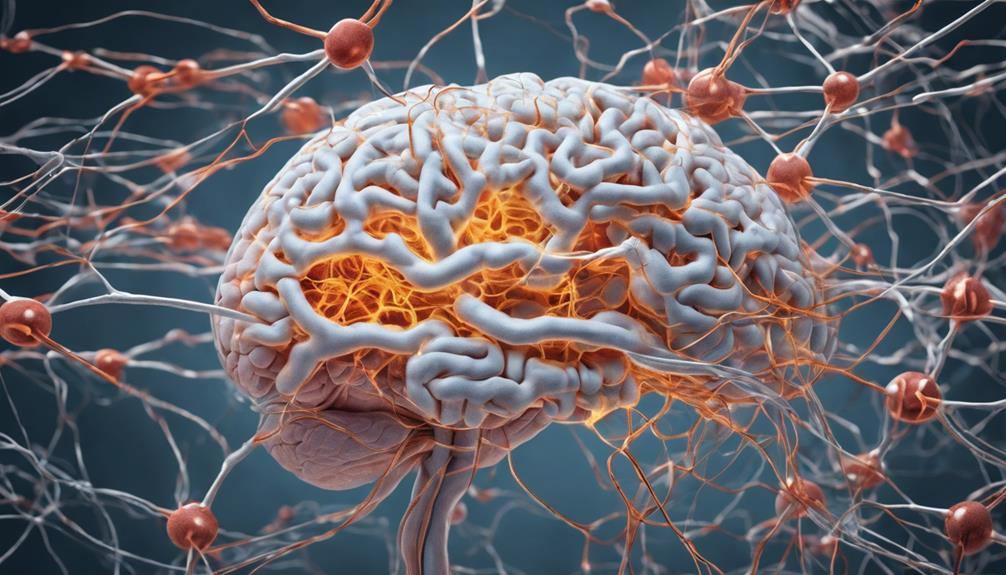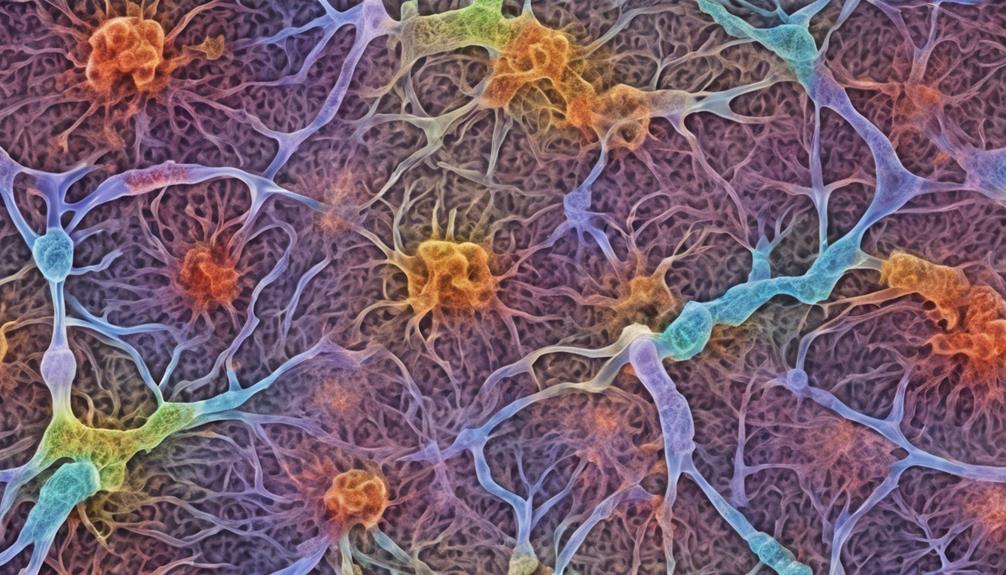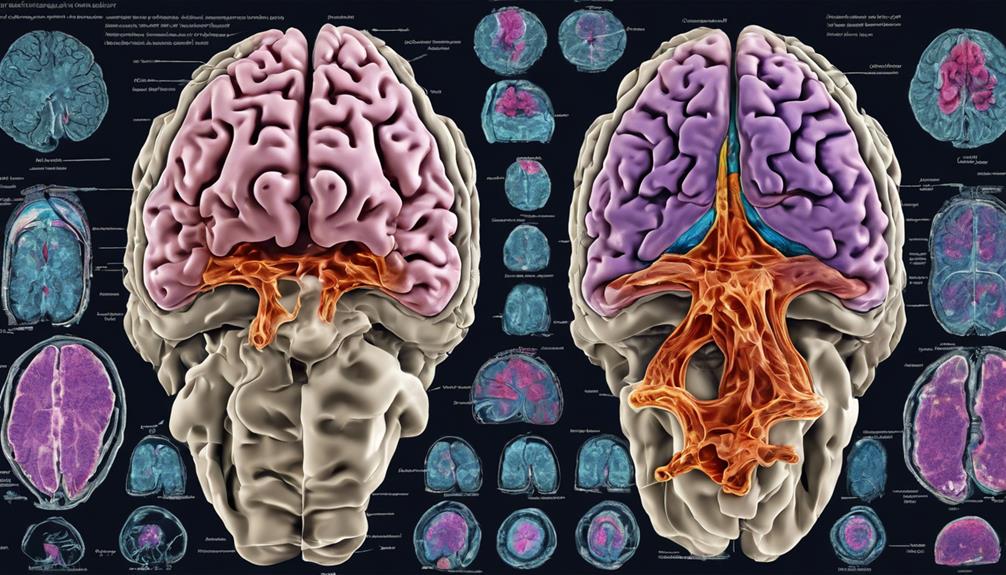Have you thought about how taking Gabapentin may increase the risk of developing dementia, despite being aware of the potential negative effects of medication?
The relationship between Gabapentin use and cognitive decline is a topic that warrants attention and further exploration.
As we uncover more about the mechanisms underlying this connection, it becomes crucial to evaluate the implications for individuals using Gabapentin and their long-term cognitive health.
Stay tuned as we unravel the complexities surrounding Gabapentin and dementia, shedding light on how best to navigate these concerns in clinical practice.
Key Takeaways
- Gabapentinoids linked to 45% increased dementia risk.
- Higher cumulative doses correlate with elevated dementia risk.
- Monitoring cognitive changes crucial for gabapentinoid users.
- Gabapentin may worsen cognitive decline, especially in older adults.
Research on Gabapentin and Dementia
In recent research studies, the association between gabapentin and dementia risk has been substantiated, indicating a notable increase in cognitive decline among individuals using gabapentinoids.
The retrospective cohort study revealing a 45% heightened risk of dementia with gabapentin or pregabalin use highlights the potential cognitive adverse effects of these medications.
Gabapentinoids such as gabapentin and pregabalin, by modulating neurotransmitters and calcium fluxes, may contribute to the observed dementia risk.
Particularly concerning is the link between regular gabapentinoid use for epilepsy control and an increased risk of dementia, especially in younger individuals and those exposed to higher cumulative doses.
Furthermore, the off-label use of gabapentinoids beyond approved indications underscores the importance of monitoring cognitive changes in patients, especially older adults.
This research emphasizes the necessity for healthcare providers to carefully consider the risks of gabapentinoids in relation to cognitive decline and dementia, prompting closer attention to dosing, indications, and potential long-term effects on cognitive function.
Potential Mechanisms of Gabapentin-Related Dementia

The mechanism underlying the potential link between gabapentin use and dementia risk involves the modulation of neurotransmitters and calcium fluxes in the brain, impacting cognitive function. Gabapentinoids like gabapentin and pregabalin exert their effects through various pathways:
- Modulation of Neurotransmitters: Gabapentinoids inhibit the release of excitatory neurotransmitters such as glutamate, affecting neural signaling pathways crucial for cognitive processes.
- Action on Calcium Channels: By binding to voltage-gated calcium channels on neurons, these drugs alter the transmission of signals involved in cognition and memory formation.
- Cumulative Doses: Higher cumulative doses of gabapentinoids have been associated with an increased risk of cognitive impairment and dementia, highlighting the importance of dosing considerations.
- Off-label Use: The off-label use of gabapentinoids for conditions like pain syndromes and anxiety may exacerbate cognitive decline and raise the risk of developing dementia beyond approved indications.
- Impact on Cognitive Function: The interference with neurotransmitter release and calcium fluxes underscores the complex relationship between gabapentin use and cognitive function, necessitating further research into the mechanisms at play.
Impact of Gabapentin on Dementia Progression
With its established association with an increased risk of dementia, gabapentin's impact on dementia progression warrants thorough investigation through rigorous analytical studies. Research indicates that patients exposed to gabapentin or pregabalin have a higher incidence rate of dementia, suggesting a potential link to cognitive decline. The hazard ratio of 1.45 for dementia risk in gabapentin or pregabalin-exposed individuals further supports this association.
Moreover, studies have highlighted a dose-response relationship, where higher cumulative doses of gabapentinoids are correlated with an elevated risk of dementia. Interestingly, younger individuals and those with higher cumulative defined daily doses of gabapentinoids may be more susceptible to developing dementia.
Understanding the implications of gabapentin use on dementia progression is crucial for healthcare providers to make informed decisions when prescribing this medication. Further exploration through retrospective studies focusing on cumulative doses and susceptibility factors is essential to comprehensively assess the impact of gabapentin on cognitive health.
Managing Dementia Risk While Using Gabapentin

Exploring strategies to mitigate dementia risk in individuals using gabapentin involves a comprehensive evaluation of dosing regimens and patient-specific susceptibility factors. When considering the management of dementia risk while using gabapentinoids, it's crucial to address various aspects to optimize patient outcomes.
Some key factors to consider include:
- Optimal Dosing: Ensuring the appropriate dosage of gabapentinoids based on the individual's condition and response to treatment.
- Monitoring Cumulative Doses: Regularly assessing the total amount of gabapentinoids consumed over time to minimize the risk of cognitive decline.
- Age Consideration: Recognizing that younger individuals may be more vulnerable to dementia risk associated with gabapentin use.
- Avoiding Off-label Use: Restricting the prescription of gabapentinoids to approved medical indications to reduce cognitive impairment.
- Long-term Effects Evaluation: Monitoring patients regularly for any signs of cognitive impairment or dementia progression during extended gabapentin therapy.
Future Implications and Recommendations
Investigating potential cognitive mechanisms affected by gabapentin use in older adults remains a critical focus for future research on dementia risk management strategies.
Longitudinal studies are essential to evaluate the lasting impact of gabapentin on cognitive and functional status in the elderly.
Monitoring cognitive and functional changes in older adults prescribed gabapentin can provide insights into its association with dementia risk.
Exploring alternative treatment options for managing dementia-related symptoms while mitigating cognitive decline is imperative for enhancing patient outcomes.
Pharmacovigilance efforts should be intensified to assess the cognitive effects of gabapentin in older adults, guiding the development of updated clinical practice guidelines.
Future research endeavors should prioritize elucidating the mechanisms through which gabapentin may influence cognitive decline in the aging population.
Frequently Asked Questions
Is Dementia a Side Effect of Gabapentin?
Yes, dementia can be a side effect of gabapentin. Studies have shown a significant association between gabapentin use and cognitive decline in older adults.
The drug has been linked to an increased risk of dementia, especially with higher cumulative doses. Regular use of gabapentinoids, like gabapentin, can elevate the risk of cognitive impairment and dementia.
The modulation of neurotransmitters by these drugs may contribute to cognitive adverse effects.
What Are 3 Things to Never Do With Your Loved One With Dementia?
When caring for a loved one with dementia, it's crucial to avoid arguments, leaving them alone in unfamiliar places, and overwhelming them with too many tasks. Instead, simplify interactions, use clear language, and validate their emotions.
Research shows that 80% of caregivers experience increased stress levels. By following these guidelines, we can provide better care, fostering connection and comfort for our loved ones with dementia.
What Do They Give Dementia Patients to Calm Them Down?
When dementia patients exhibit agitation, healthcare providers may administer medications to help calm them down. These medications can include antipsychotics, antidepressants, or anxiolytics. The choice of medication depends on the patient's specific symptoms and needs.
It's essential to assess the individual's overall health and consider potential side effects before initiating any medication regimen for managing agitation in dementia patients.
Is Gabapentin Hard on the Brain?
Yes, gabapentin can have a significant impact on the brain. It's essential to consider the potential cognitive effects when using this medication.
Research indicates that higher cumulative doses of gabapentin can lead to cognitive impairment and potentially increase the risk of dementia, especially in individuals under 50 years old.
Understanding how gabapentin affects neurotransmitter modulation is crucial in evaluating its impact on brain function.
Conclusion
In conclusion, the evidence suggests a significant association between Gabapentin use and increased dementia risk, with a hazard ratio of 1.45 in exposed individuals.
Mechanistically, Gabapentinoids may impact neurotransmitter function and calcium fluxes, potentially contributing to cognitive adverse effects.
Moving forward, it's imperative to closely monitor patients, particularly younger individuals with higher cumulative doses, to mitigate the risk of dementia progression.
In a nutshell, when it comes to Gabapentin and dementia, the writing is on the wall for potential cognitive implications.









